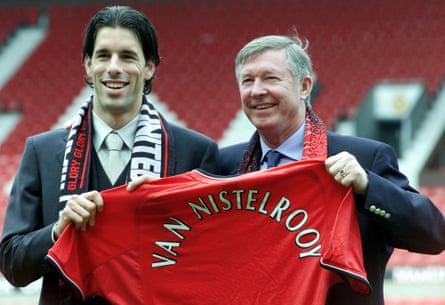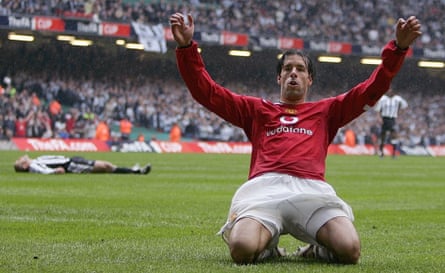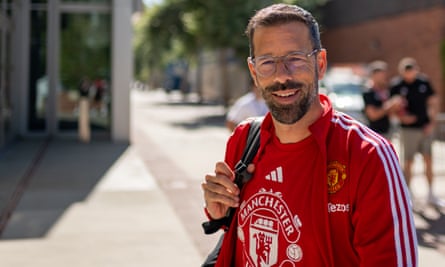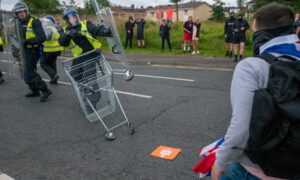‘Listen, you’re not going to start most of the games. You’re going to come on. It’s important now that you’re taking care of the younger players.” It was my last season as a player, at Málaga, and Manuel Pellegrini had told me I wasn’t going to be a regular starter. In the beginning, it was difficult to accept. I was a player, not a coach, and I wanted to play.
In the end, though, it made me transform my ideas and think: ‘OK, how can I help these guys?’ Off the pitch, I could give them advice on how to create a lifestyle that would benefit them as a player. On the pitch, I could help them improve – and the club at that time had lots of young attackers. Salomón Rondón was 23, Isco was 22, Juanmi only 19, Samu Castillejo – who later went to Milan – even younger.
First on the mental side, and then later on the tactical and technical sides, I could help these guys. I started to build up a relationship with them. Through talking and training, I realised that, hey, I can have an influence. That really got me into coaching, and I went straight into doing my badges.
I started out at PSV, in the academy, before joining the Dutch national team setup under Guus Hiddink after the 2014 World Cup. When you work with a manager like Hiddink, who has been at Real Madrid, Chelsea and many other national teams, and been so successful, it is a great experience.
How does he think about the game? How does he think about team dynamics and individual conversations with players? What about handling the media? How do you plan your training sessions and your meetings, and how do you analyse opponents?
For me, this was fantastic. I learned so much and it was the best thing that could happen in that phase of my coaching career. Unfortunately, the results weren’t great; Hiddink lost his job and, in the end, we didn’t qualify for Euro 2016. Hard times, of course, but I am still in touch with Guus. I was able to always support him through good and bad, and so that gives a slightly good memory of that time.
I returned to the PSV academy. In an academy, development is the No 1 and winning is two – but I felt that they almost went hand in hand. In the under-19s, especially, the players know that in the Dutch league you can make your debut at such a young age. Players could jump straight from my team into the first team – and they have to be ready. That happened with Noni Madueke, for example, and Cody Gakpo was another who went from the under-19s straight into the first team, making their debut and then playing European football. It’s hard to imagine, but that’s what you constantly tell the players at that age.
“Listen, two months from now you could be playing in front of 30,000 people,” I would say to them. “This is what is expected, with and without the ball, and in transition moments. This is what your lifestyle outside of football should look like.”
As a player, the most important thing I took from working with Sir Bobby Robson and Sir Alex Ferguson was their relationships with the individual. It’s not a football player; it’s a person. When you reach that connection, you get the best out of people – and from there on you can help them build their careers. I never let that thought go out of my mind.

Sometimes you have to be tough on them and sometimes you have to get your arm around them. That mixture is important, but the most important thing is to always be honest and straight. When you have knowledge about the game and what is necessary at the highest level, you must share it.
As a coach, you just try to help players reach their goals. And it is something that makes you feel really proud when you see young players develop. Gakpo went on to Liverpool and Noni to Chelsea, but there are a couple more from that time who are now in the PSV first team. The feeling I get when I see this is comparable with winning a league, really.
In the summer of 2021, I took over Jong PSV – and that was a great experience. To play in the Dutch Championship with a team of 18 and 19-year-olds is a big challenge, and it’s also about survival. At under-17, under-18 and under-19 level, the lads are used to being one of the top teams; you always have the ball, always attacking, always dribbling.
Then, suddenly, you are facing men; tough teams in full stadiums, hostile home crowds and having to defend in a low block. You have to find ways to win games, even if you’re not the better team. These are fantastic experiences for young players, but also for me as a coach. What is necessary, in any given game, to get the result: is it a low block and counterattacks? Is it high pressing, or having the ball and playing in smaller spaces in the final third?
With 18 and 19-year-olds, and no experienced players to lead the side, it comes down to the coaching staff to make sure the team survives in that league. We managed that and it was a special year.
As a player, my career had been one of a long buildup. I came through after three years in the second tier with Den Bosch, and then into a mid-table Eredivisie team in Heerenveen. Then I went to a top team, in PSV, and then abroad – but I was 25 when I signed for Manchester United and 30 when I moved to Real Madrid. I had needed that time and I felt the same way about my career as a coach.
So, in that sense, I felt good about my path when the club first spoke to me about taking over the first team in the summer of 2022. They had told me about the difficult financial situation, and that we were going to need to sell players, but they were trying to get another year out of Roger Schmidt. I thought, OK, I will do another year of Jong PSV.
In the end, Roger left for Benfica. I spoke again with the club, and they made a plan for the financial situation in which we would work to resolve it together. The 2022-23 season would be one where we had to get things right economically and still perform on the pitch – and that would be a challenge. We came together on that, though, and I went for it.
It wasn’t a question of what football I wanted to play, though. It was more about, with the players we have, what is the best strategy to get the maximum out of the season? We knew we had to sell players for massive amounts of money, and that meant selling our best players in the winter break. So it was mostly about adapting to the situation rather than implementing my own philosophy or style of play, as I had done with Jong PSV and the youth teams.
It was a fantastic process, though, because I learned a lot through analysing the squad, analysing individual players, talking a lot with the coaching staff about how to get the maximum out of the players. Is it the high press, is it a mid-block, is it counterattacking or sustained attacks in the final third?And, of course, it varies per game. Many times in our own league we would be the better team, but sometimes in the big games, and in Europe, we would not be. We had to adjust and get the best not just out of the players, but also out of each other as coaches.

We were able to sign one or two players, and of course players who are available on a free are always welcome in difficult economic times. One of those was Xavi Simons, and the scouts at the club did a tremendous job in convincing me to take a look at him. I studied the clips they were giving me and was convinced immediately. So I spoke to him and I remember well the video call we had.
I made a presentation about his qualities and the things, in my opinion, he could improve. My gut was that I was going to tell him what I really thought of him as a player in that moment, and then explain the potential of where he could get to, and how we were going to help him do that – through training sessions and individual coaching, but also based on the team.
Xavi was very mature in his conversation with me, and it worked because he was bothered only about one thing: “Where can I improve?” He was triggered by improving and learning, and that’s where we made the connection. He trusted the plan, and the process, and in the end he had an unbelievable year – he was joint top-scorer in the Eredivisie, made his debut for the Netherlands and went to the World Cup. What he achieved that season was unthinkable, really, but it was all to his credit.
We had some massive wins early in the league season. We beat Arne Slot’s Feyenoord at home, and Ajax away. These were big moments, and I was confident that we were on the right path. But we knew the winter break was coming, and that two of our best and most important players – Gakpo and Madueke – would have to be sold.
Others went, too: Philipp Max left for Eintracht Frankfurt, Yorbe Vertessen went to Union Saint-Gilloise in Belgium, Ki-Jana Hoever’s loan from Wolves ended and he went to Stoke City, and Marco van Ginkel went to Vitesse. In some ways, after the World Cup, we knew we would have to start again.
We drew our first two games after the winter break and then lost at Emmen in our fourth game back. That was seven points dropped and, in the end, that was too many if you want to win the league. The team ended up finishing second, seven points behind Feyenoord, but we beat Ajax to win the Johan Cruyff Shield in my first game and then did it again to win the KNVB Cup. Maybe winning all three trophies would have been too much.
I stepped down with one game of the Eredivisie season to go. A head coach needs to be aligned with the board and the directors, and to know about plans for the future. When you’re not, it’s impossible to continue. But I had absolutely loved challenging myself against the best coaches, both at home and in European football.
In the Eredivisie, I loved going up against Slot. His teams have a very recognisable style and he is very clear in his ideas. He built the Feyenoord squad on those ideas, and he got in the players who could deliver on them. It’s building up from the goalkeeper from the back, combination play and finding the free man everywhere, so you need to make sure your press is right. But you also need to get your buildup sorted, because it’s high and intense pressure in your own half. Slot makes you prepare every game properly, but I loved that challenge. He has proven himself and his idea in Holland, and I am sure he can be very successful abroad as well.
Coaching in Europe is one of the best experiences I’ve had, as either player or coach. Of course, I have to mention that we didn’t qualify for the Champions League, which would have been even better – but playing in the Europa League was amazing. Two group games against Arsenal – against a team at the top of the Premier League, and with a top manager. Mikel Arteta is another class act who is very clear in his ideas. You can see with the profile of the players he has brought in, and the time he has been given to develop his team, how much a club can grow.
For both myself and my players to be able to match ourselves against this team and these players, and see where you are in that moment, is a fantastic experience. You learn so much, and you only want more of that.

Since leaving PSV, I have invested time being with other coaches. I asked to go to Madrid, and Carlo Ancelotti invited me over for a week. I attended every session, every meeting, and learned so much from him. The club was fantastically open in receiving me; Raúl was there too, training with Castilla, the second team, and Álvaro Arbeloa with the Under-19s. I also rang my old manager at Málaga, Pellegrini, who invited me over to Sevilla, where he is with Real Betis. These are all fantastic moments for me to learn again.
I love the game and I love a certain way of playing. At Manchester United, Sir Alex was always pushing us forward. Look forward, play forward, get crosses in, shoot on target. As a player, I loved the way that made me feel. I wanted to play like that, and I want to transmit that same feeling to my teams, to my players.
There is a long history of great Dutch coaches whose careers I admire so much: Rinus Michels, Johan Cruyff, Louis van Gaal, Guus Hiddink, Dick Advocaat, and now Erik ten Hag and Arne Slot. It is motivational for me to continue learning, improving myself and maybe one day make the steps to show I am capable of that. It’s a fantastic challenge and I’m looking forward to taking it on.
Source: theguardian.com


















